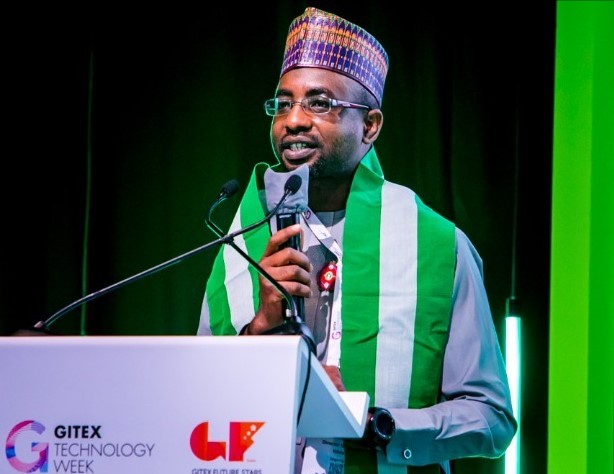Deploying Blockchain Technology To Drive Healthcare in Nigeria
By Inyene Ibanga
TECH DIGEST – This year’s edition of the Middle East premium technology show – the Gulf Information Technology Exhibition (GITEX 2020) – witnessed a wide array of tech launches and innovations, with attendees getting to handle the latest gadgets and devices put on display by exhibitors from across the tech ecosystem.
The event, which held at the Dubai Trade Centre from December 6 to 10, hosted a variety of global tech firms and a large number of tech enthusiasts from more than 80 countries, including Japan, Saudi Arabia, Brazil, Italy, Nigeria, Turkey, Belgium, Romania and India.
Now in its 40th edition, the event featured the main GITEX conference agenda, GITEX Future Stars, GISEC, Future Blockchain Summit and Marketing Mania for tech industry, all under one roof, which enabled attendees to hear key insights from a huge range of international speakers, influencers and exhibitors across the five shows.
GITEX 2020, the only face-to-face technology show in the year, focused on the key themes of 5G, Artificial Intelligence, Analytics, Future Mobility, Digital Economies, Cybersecurity and Cloud, and Edge computing.
For five days, the event provided a platform for young innovative companies to showcase their ingenuity and afforded startups to connect with a host of global investors and financiers to accelerate their growth.
Through such interactive platforms, startups and budding tech companies were able to network and kickstart multinational distribution enterprises by utilising Artificial Intelligence, Blockchain, 5G, the Internet of Things (IoT) and cloud based technologies.
A major focus of GITEX 2020 was the unraveling of blockchain technology as the core of the foundation driving the digital transformation initiatives of businesses that have been birthed since the advent of the COVID-19 pandemic.
Attendees at the Future Blockchain Summit had access to expand networking, conversations, business opportunities and innovations across the industry, as leading blockchain enterprises, startups and industry experts exchanged ideas and learnt new knowledge about this revolutionary and most influential invention.
Blockchain technology is at the core of our digital future lives and environments, as it impacts virtually every sector of human endeavour. This technology has gone beyond its advent in banking and cryptocurrency to transform other industries and sectors, from the extractive, to manufacturing, distribution and security.
The impact of blockchain applications is far-reaching and cuts across sectors such as healthcare; education/academia; voting; e-commerce; energy management; retail; law enforcement and critical infrastructure security.
Others include crops/agriculture; waste management; government and public records; public transportation; internet identity; cloud computing/storage; messaging apps; sport/entertainment rights and industrial IoT, among others too many to mention.
Annual global spending on blockchain solutions is projected to reach nearly $16 billion by 2023. In view of the popularity demonstrated by blockchain applications in finance, many entrepreneurs have come to believe that blockchain has the power to disrupt many more industries, especially healthcare.
It is upon this premise that experts at GITEX 2020 harped on the need for adoption of blockchain technology for the healthcare ecosystem in providing increased security, privacy, and interoperability of patients’ health data.
Speaking at the forum, the director general, National Information Technology Development Agency (NITDA), Kashifu Inuwa outlined some of the benefits of blockchain to the healthcare sector.
Read Also:
He explained that the said blockchain technology would transform the healthcare sector by placing the patients at the centre of the healthcare ecosystem; giving them easy access to their secure data anywhere and anytime; and eliminating fake drug, as patients would be able to see the sources of the drug, from the manufacturer, before its reaches the final health facilities, and patients do not need to apply to health facilities to have access to their medical records.
Kashifu told the delegates that Nigeria is working on developing the blockchain adoption strategies, not only as a business disruptor for creating new products, services and innovative ways of doing things but also as a foundation technology that could facilitate transformation in most sectors of the country’s economy.
He informed that some of the country’s startups attending GITEX had developed some blockchain applications for the benefit of humanity, as a demonstration of Nigeria’s readiness to embrace and adopt the technology.
He observed that while Africa as a continent lost out during the first, second and third revolutions because of the huge capital and investment requirements, the fourth industrial revolution remains the best opportunity for the continent to play active roles, as it requires only talent, mobile connectivity and adequate skills.
To this end, Kashifu added that NITDA is encouraging Nigeria’s youthful populations to embrace modern technologies for employment generation and self-reliance through training, mentorship, internship placements and start-up vouchers, the agency is also helping them with working space and logistics, before promoting their products in the market.
Other experts who spoke on the technology included Olinga Taeed, a professor in blockchain technology; the managing partner of Health Group and chief health privacy security officer BTBlock, Dr. Alice Loveys, and consulting leader, Government and the Public Sector at IBM, Saqr Ereiqat.
Blockchain simply refers to a system of recording information in a way that makes it difficult or impossible to change, hack, or cheat the system.
Essentially, transactions through blockchain technology could allow hospitals, patients, and other parties in the healthcare value chain to share access to their networks without compromising data security and integrity. The decentralised nature of the technology creates one ecosystem of patients data that can be quickly and efficiently referenced by doctors, hospitals, pharmacists and anyone else involved in treatment, thereby leading to faster diagnoses and personalised care plans.
With the blockchain platform in place, it would be possible for pharma companies to collect data in real-time to enable them offer a vast array of medical products and treatments, which are specifically customised for the patients. It will mark the point of creation/origin of the drug and then continue to record data every step of the way, including who handled it and where it has been, until it reaches the consumer.
I strongly believe that Nigeria stands to derive immense benefits from the use of blockchain in the healthcare sector because it is not owned by a single entity. Data is immutable, as no one can tamper with the data that is inside the system (blockchain). It is transparent, and easy to track the data whenever it is necessary.
The capacity of blockchain for transparency, immutability, security, innovation and reduction of transaction costs and innovation are the major qualities that continue to help the technology gain so much admiration in all sectors of human endeavour.
In fact, there is no better time than now for government and stakeholders in Nigeria’s healthcare ecosystem to forge a robust partnership towards embracing and adopting the blockchain technology to drive reforms for enhanced supply chain management, traceability of counterfeit drugs, integrity of medical records, treatment regimens, and single patient identification, as well as checking drug ingredients.
It is my hope that Nigerian startups unveiled at GITEX 2020 will bring their innovations to bear towards helping to solve our healthcare challenges, and while they do so, public and private sector organisations should provide incentives to encourage young tech companies to achieve success in their innovative pursuits.
Inyene Ibanga is Managing Editor TechDigest, Wuye District Abuja.



















